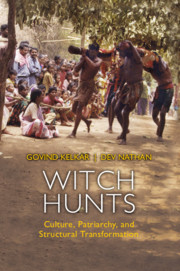8 - Accumulation, Dispossession, and Persecution
Published online by Cambridge University Press: 12 May 2020
Summary
This chapter connects witch hunts with the emerging capitalist economy. In this chapter we first take up the connections of indigenous peoples and peasants in developing economies with the market economy. This is followed by an analysis of how witch persecutions play out within the context of struggles over the change from subsistence to accumulative economies. At different points we make comparisons with situations in early modern Europe to show where similar processes of change and witch persecutions were taking place. Looking at witch persecutions in contemporary indigenous and peasant societies and comparing them with witch hunts in early modern Europe brings out one important factor in common between these contexts—they are both situations of structural change and intense conflict. There are both those who opposed the changes from subsistence to accumulative economies and those who were in favour of such change. In this context, witch persecutions and hunting can take on the shape of both promoting accumulation or opposing accumulation. There are different moral economies, or even cultures, in conflict over here, and witch persecutions can play both brutal levelling and accumulating roles.
Indigenous societies and connection with capitalist economy
The importance of seeing witches and witch persecution in the context of the developing capitalist economy is now a common theme in discussions of the witch question, particularly after the collections edited by Jean and John Comaroff (1993b), Peter Geschiere's book The Modernity of Witchraft (1997), and then Henrietta Moore and Todd Sanders (2001). We summarize below our understanding of these connection across Africa, Latin America, other parts of Asia, and the Pacific, the last being represented by Papua New Guinea.
The relations of the indigenous peoples of central India with the state and market have changed over time. Markets have come to play an increasingly important role even in acquiring the necessities of daily life. Important is the spread of the ideology of accumulated development. This signalled a transition from Ranajit Guha's ‘dominance without hegemony’ to ‘dominance through hegemony’ (Guha 1997) of the ideas of market-based development, or capitalist development. But there need not be just one type of institutional set-up in a capitalist economy, as the varieties of capitalism (Hall and Soskice 2001) or the alternative modernities literature (Gaonkar 2001; Appadurai 2001) both argue.
- Type
- Chapter
- Information
- Witch HuntsCulture, Patriarchy and Structural Transformation, pp. 145 - 168Publisher: Cambridge University PressPrint publication year: 2020



